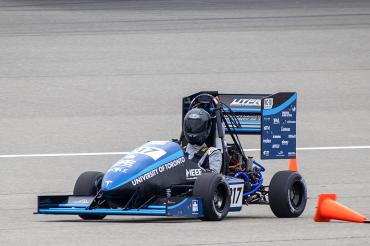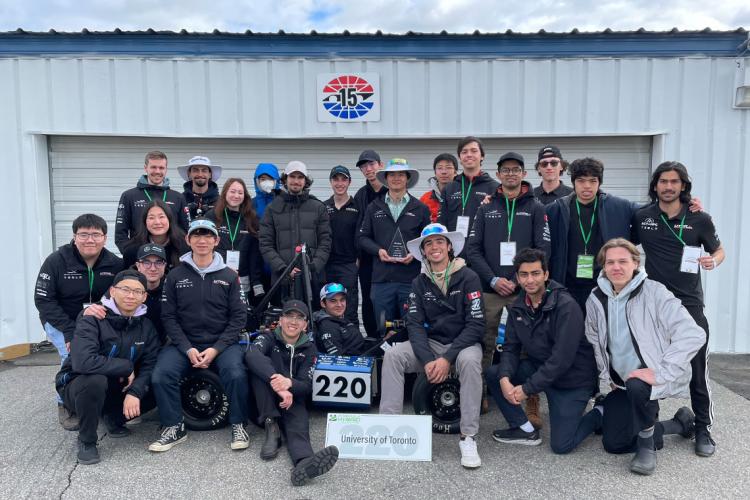'It's a team effort': Electric car sparks international success for U of T students

The University of Toronto Formula Racing team’s new electric vehicle took part in the Formula SAE Electric competition at the Michigan International Speedway (photo by Trevor Foote)
Published: July 17, 2023
Five months after unveiling their first electric-powered vehicle, the undergraduate students who make up the University of Toronto Formula Racing (UTFR) team are having a stellar season, earning some of their best results in over 15 years.
Now the team is bound for Europe, following strong showings in competitions in the United States.
For more than two decades, UTFR has enabled undergraduates at U of T to gain experience designing and building open-wheel race cars for competitions around the world.
These competitions showcase the capabilities of the car on the track as well as the skills of the team that designed it – and, in many cases, provide a career boost to graduating students.
The 2022 season represented a milestone for the team – for the first time, UTFR made the decision to design an electric-powered vehicle.
“The transition to electric was challenging,” says team captain Daniel Wing, an engineering science student in the Faculty of Applied Science & Engineering.
“We’ve had about 23 years of experience developing a combustion-powered car every year and our initial aspiration was to develop the new electric car under that same timeframe.”

(photo by Trevor Foote)
However, 2022 would prove to be a difficult year to make the switch to electric. Alongside the challenges of developing the new electric powertrain architecture for the vehicle, the team faced setbacks stemming from supply chain issues, including a microchip shortage.
“We had to shift our timeframe and say, ‘This is one of the first years we’re not going to build a new car,’ and shift our focus onto preparing for 2023," Wing says.
In May of this year, UTFR returned to competitions. Their new electric car made its on-track debut at the New Hampshire Motor Speedway as a part of the Formula Hybrid + Electric Competition.
Over four days, UTFR and 20 other student teams competed in events that tested the acceleration, durability and maneuverability of the cars, as well as the team’s project management and engineering design skills. After completing all five events, UTFR placed first in the overall competition.
“We were fortunate to come away with a win at New Hampshire because our philosophy of reliability ties well into the longer-endurance events that are run there,” says Wing.
“That was our first overall win at any competition since 2006. To have it be our first competition with our first electric car inspired so much confidence.”
Shortly after competing in New Hampshire, the UTFR team travelled to Michigan to participate in Formula SAE Electric, the largest Formula SAE competition in North America.
Competing against 68 other teams, UTFR demonstrated strength in the endurance and efficiency events, tying their all-time best result at Michigan with an overall position of fifth place.
With two successful competitions behind them, the UTFR team is looking to extend their successful streak as they ship their car overseas to compete in two Formula Student events in Europe – one in the Czech Republic, and the other in Germany, which is the largest Formula Student competition in the world.
These competitions will not only further test the team’s new electric architecture, but will debut their self-driving system.
“Because this is our first year competing with a self-driving car, we’re focusing on the driverless acceleration and skid-pad events,” Wing says.
“These events are simpler and will get our baseline systems running, but we’ve developed our architecture to be scalable.”
UTFR was at the Honda Indy event at Exhibition Place over the weekend to showcase the team's work to racing enthusiasts.
"We design and manufacture these cars within an eight-month cycle and then we compete for four months," Emily Wright, the team's business director and a management and international business student at U of T Scarborough, told CBC Toronto.
Reflecting on one of the most successful starts to a season in team history, Wing believes that what sets UTFR apart from other teams is a unique approach to design.
“Our philosophy this year is maybe uncommon among a lot of engineering teams – our priority is to focus on building a team first, and the car will come with that," Wing explains.
“Even though it’s the car out there with the driver on track, it’s all of us that work to make it happen and get the car as ready as it can be to perform as well as it can on any given day. We’re also grateful for the support from the faculty and our generous industry sponsors. It’s a team effort.”



